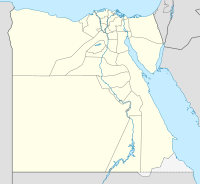| Fayid · فايد | ||
| Governorate | Ismailia | |
|---|---|---|
| Residents | 21.808 (2006) | |
| height | 23 m | |
| no tourist info on Wikidata: | ||
| location | ||
| ||
Fayid (also Fayed, Arabic:فايد, Fayid) is an Egyptian city on the west bank of the Great Bitter Lake, which is part of the Suez Canal is, and is located about 20 kilometers south of Ismailia. From a former fishing village, it has developed into a holiday area mainly for Egyptians.
background
Located on the Bitter Lake, the main line of business is fishing. After the reopening of the Ismailiya Canal in 1862, which is used to supply drinking water to the cities on the Suez Canal, agriculture is also increasingly practiced here. Products include wheat, sesame, peanuts, and mango.
Like other places along the Suez Canal, Fāyid was of strategic importance and was the stationing place of British soldiers until 1955. Several military hospitals also belonged to the garrisons. In June 1941 a military cemetery was set up here, initially Geneifa New War Cemetery, later Fayid War Cemetery was called. The last burial took place in 1955.
During the Second World War there were several camps for German prisoners of war in the vicinity of Fāyid, in which up to 50,000 prisoners were temporarily housed. The camps included labor camps. The few diversions included soccer games between prisoners from different nations.[1] In 1948 the camps were closed.
After the revolution of 1952 and the withdrawal of the British in 1955, Egyptian troops were stationed here and there is a college for officer candidates.
Around the turn of the millennium, Fāyid and its neighboring villages Sarābiyūm (Arabic:سرابيوم) And Abū Sulṭān (Arabic:أبو سلطان) To develop into a holiday area, which is primarily intended for Egyptians. Several hotels and holiday apartments were created and are still being built. Around 20 sandy beaches, clubs and holiday villages are intended to attract tourists.
In 2006 about 22,000 people lived here.[2]
getting there

You can get there via trunk road 24 from Ismailia to Sue. An arrival e.g. from Cairo to Ismailia is possible by train or bus. From Ismailia you can continue your journey by taxi.
mobility
Tourist Attractions
Fayid War Cemetery


The main attraction is the Commonwealth Cemetery 1 Fayid War Cemetery(30 ° 18 '26 "N.32 ° 19 ′ 39 ″ E), Fayid war cemetery, where burials took place between 1941 and 1955. The cemetery is open from Saturday to Thursday between 7:30 a.m. and 2:30 p.m.
Today there are 1814 burials of soldiers known by name in the cemetery. Of these, 765 soldiers were buried during the Second World War. 190 graves come from soldiers who were reburied here from the Qassassin African Cemetery. 616 graves belong to civil garrison employees, a further 440 graves belong to fallen or deceased soldiers from other nations.
At the end of the cemetery, the Fayid Memorial (Fayid Memorial) commemorates 256 men who could not be buried here for various reasons.
miscellaneous
The only attraction besides the Suez Canal itself is a lighthouse.
To the east and south-east of Fāyid are the 2 Great bitter lake, Arabic:البحيرة المرة الكبرى, al-Buḥaira al-Murra al-Kubrā, and the 3 Little bitter lake, البحيرة المرة الصغرى, al-Buḥaira al-Murra aṣ-Ṣaghrā.
More attractions are below Ismailia listed.
activities
The main activities concern water sports. Boats and motor boats are available for hire.
kitchen
In Fāyid there are some fish restaurants, which of course offer the fish caught here and other seafood that are of good quality here.
accommodation
medium
- 1 Bonita Village (فندق بونيتا, Funduq Būnītā), Kabrit. Tel.: 20 (0)62 327 2674, Email: [email protected]. 3-star hotel with 76 rooms.(30 ° 14 '2 "N.32 ° 26 ′ 41 ″ E)
- 2 Shamoussa Village (قرية شموسة, Qaryat Shamūsa), 59 Km Suez Canal Road. Tel.: 20 (0)64 366 1525, (0)64 366 1009, Fax: 20 (0)64 366 4839. 3-star hotel with 63 rooms.(30 ° 20 ′ 29 ″ N.32 ° 18 ′ 10 ″ E)
Upscale
- 3 El Morgan Village (قرية المرجان, Qaryat Murgan), Km 54 Ismailia-Suez Road. Tel.: 20 (0)64 390 0400, (0)64 390 0452, Fax: 20 (0)64 390 0400, Email: [email protected]. 4-star hotel with 94 rooms.(30 ° 18 '14 "N.32 ° 19 ′ 59 ″ E)
- 4 Palma Abu Sultan Hotel, Abu Sultan, Fayed. Tel.: 20 (0)64 340 0421, (0)64 340 0422, Fax: 20 (0)64 340 0862. 4-star hotel with 64 rooms.(30 ° 24 '35 "N.32 ° 20 ′ 2 ″ E)
- 5 Six Corners Resort, Km 32, Abu Sultan, Fayed. Tel.: 20 (0)64 340 0232, (0)64 340 0849, Fax: 20 (0)64 340 0849, Email: [email protected]. Unclassified hotel with 48 rooms.(30 ° 22 '52 "N.32 ° 18 '22 "E)
trips
There are primarily excursions to the nearby Ismailia at.
Web links
- Fayid War Cemetery, Commonwealth War Graves Commission website.
Individual evidence
- ↑Ralf Klee: The football king from Bittersee, Report on one day (Spiegel Online) from September 4, 2008.
- ↑Population according to the 2006 Egyptian census, Central Agency for Public Mobilization and Statistics, accessed April 26, 2016.


